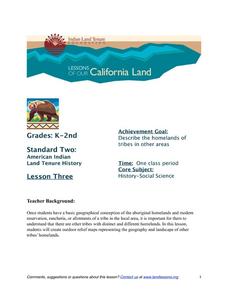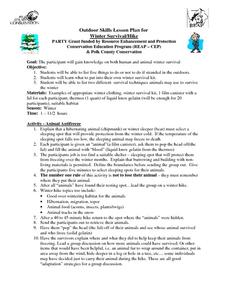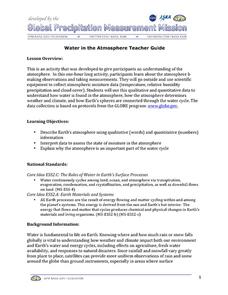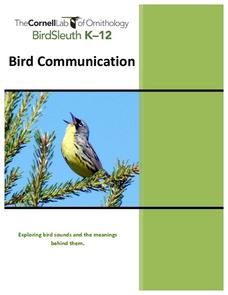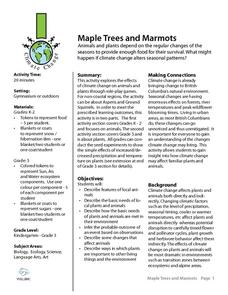Scholastic
Minibeasts
Lead young scientists to discover insects outdoors. After investigating, students will record observations, learn about these fascinating creatures, craft, and role play.
Curated OER
Child Safety
Explore reading comprehension and child safety in this young adult literacy lesson plan. High schoolers practice using context clues to figure out word meanings after observing a teacher model this process. They read an article about...
Florida International University
Counting FishStix
How do we count the fish in the ocean? An engaging instructional activity models how to estimate fish populations with observational surveys. Class members begin by studying the behavior of fish on the coral reef in the oceans. They...
Curated OER
Outdoor Survival
Students are introduced to basic outdoor survival concepts. They identify the seven basic needs for survival. Students describe the symptoms and treatment for frostbite and hypothermia. They compare and contrast the value of different...
Curated OER
Indoor and Outdoor Patterns
Learners explore geometry by participating in a visual illustration activity. In this pattern identification lesson, students explore inside their classroom and discuss patterns they find while tracing them on paper. Learners attend an...
Curated OER
Giving an Outdoor Plan
Students utilize their acting skills to put on an impromptu play based on a book. In this performance art lesson, students read Caps for Sale by Esphyr Slobodkina and discuss how the story could be told through human action. Students...
Haiku Society of American
Haiku: Lesson Plan for Teachers
After examining winning entries to the Nicholas A. Virgilio Memorial Haiku Competition, young poets try their hand at this fixed form.
Curated OER
Holes-Outdoor Adventure Camp
Students read the book and watch the movie, Holes. They create a brochure (containing specific information) that advertises Camp Green Lake as a newly refurbished outdoor adventure camp. They display the brochures for the rest of the...
Curated OER
Primary Lessons for Grades K-2
Students study wildlife and identify similarities and differences between their home and wild environments. In this wildlife lesson plan, students make connections between wildlife and wildlife habitats. Students then build knowledge...
Curated OER
Redwood National and State Parks: California
Use this presentation about redwood trees and parks in your ESL unit about travel and/or the outdoors. Bright photographs adorn each slide, with short descriptions of each topic. The slide show is short enough to show in one class period...
Baylor College
There's Something in the Air
Clever! In order to compare indoor and outdoor dispersal rates for the movement of gases and particles through air, collaborators will participate in a classroom experiment. Set up a circular grid and set young scholars on lines that are...
Indian Land Tenure Foundation
More Tribal Homelands
Here is a very fun idea that introduces young learners to how geographical location affects cultural development. They are introduced to four areas where Native Americans have lived in the past by reading stories and examining images....
Curated OER
Exploring Seasonal Shadows and Sunlight
What can shadows tell us about the changing season? Over several months, astronomy learners record length and position of an outdoor object's shadow, such as a flagpole. They apply the data to a growing hypothesis and note the patterns...
Polk County Education
Winter Survival/Hike
Hibernation isn't just about staying fed, it's about staying warm. Young environmentalists explore the importance of staying warm in the wilderness with a short lesson about surviving in the wild. Using gelatin to represent warm-blooded...
Leadership Challenge
Inspire Students Today to Make a Difference in the Future
Your search for a year's worth of leadership lessons is over! A lesson in a character education series provides a full two semesters of inspiring leadership activities. The resource includes individual and group challenges to ensure a...
Cornell University
What is IPM?
Discover what a pest is and how to identify one with a lesson that looks closely at our outside world and taxonomy. Scholars investigate insects and plants to practice their identification skills, take a survey, and explore the...
Berkshire Museum
Adopt a Schoolyard Tree
Help young scientists connect with nature and learn about trees with a fun life science lesson. Heading out into the school yard, children choose a tree to adopt, taking measurements, writing descriptions, and drawing sketches of it in...
Curated OER
Water in the Atmosphere
A slide show serves as the backdrop for a instructional activity on the moisture in Earth's atmosphere. Through it, mini meteorologists learn about the attributes of the atmosphere and actually use data-collecting weather tools to make...
Wild BC
Bearly Any Ice
After reviewing food chains, your class members participate in an arctic predator-prey game that exemplifies the impact of climate change of food availability. If you are in a hurry, skip this lesson, but if you have the time to...
Cornell Lab of Ornithology
Bird Communication
Sing for your dinner! Investigate the purpose of bird songs and strategies birds use to communicate. Through the lessons, individuals learn how to recognize different types of bird communication as well as hypothesize the purpose of...
Wild BC
Maple Trees and Marmots
Kinesthetic activities simulate animal activity as the seasons progress in a lesson that introduces climate change to primary pupils. The kids role-play maple trees collecting what they need to survive, but as each year comes around, the...
National Park Service
Living & Non-Living Interactions
What better way to learn about ecosystems than by getting outside and observing them first hand? Accompanying a field trip to a local park or outdoor space, this series of collaborative activities engages children in learning about the...
Cornell University
Let’s Raise Lacewings
Young entomologists explored beneficial insects and how they help control pests in the first lesson of the series. Now class members take a close look at the lacewing, which is a beneficial insect.
Computer Science Unplugged
Beat the Clock—Sorting Networks
Can multiple computers sort a list faster than one? Using a network drawn with chalk outside, groups move through the decision network to sort numbers. A series of extension questions come with the lesson and can be used in the same...













